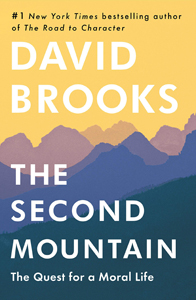 David Brooks, The Second Mountain: The Quest for a Moral Life (New York: W. W. Norton, 2018), 384 pages.
David Brooks, The Second Mountain: The Quest for a Moral Life (New York: W. W. Norton, 2018), 384 pages.
A review by Brad Keister, former Deputy Division Director of the Physics Division for the National Science Foundation.
In his newest book, New York Times columnist and PBS commentator David Brooks contrasts two views of the world, and how he has moved from the first one to the second: (1) the individualist view, in which the ego is at the center; (2) and the relationalist view, which focuses on commitment and the deep desires of the soul. The book is also a narrative of Brooks’ journey to faith.
Coming from a Jewish household, Brooks passed through many venues with distinctly Christian heritages (like attending Episcopal school as a child), but he considered himself an atheist. Then, gradually cracks appeared in his belief framework, to the point where he described himself as a “border stalker,” caught between the worlds of belief and unbelief. He went through a series of personal crises, during which his marriage fell apart, and then he emerged, gradually, into a life of faith.
This book has many parallels to those of writers like C. S. Lewis (Mere Christianity) and, more recently, Francis Collins (The Language of God), as well as the concepts of two very distinct lives in Richard Rohr’s Falling Upward, though Brooks brings his own stamp of a professional writer who is very well read. This book marks a departure from Brooks’ more politically oriented columns, but many readers will appreciate his fresh perspectives and examples regarding classic questions of faith.
Dan Clendenin: dan@journeywithjesus.net


